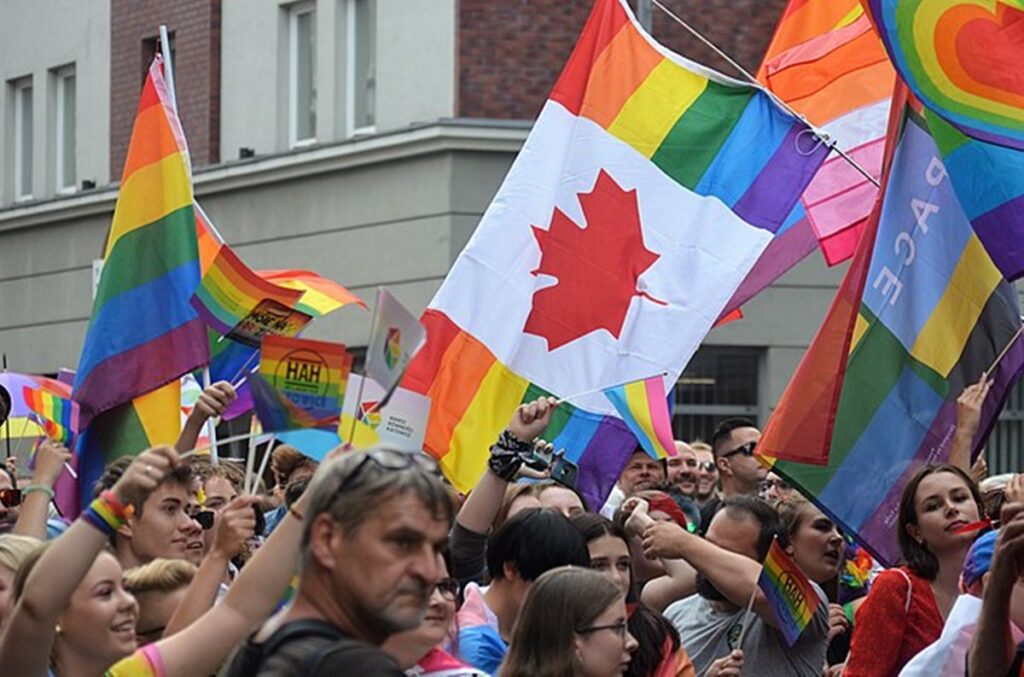Misgendering: “Using correct pronouns communicates that we see and respect a person for who they are. Especially for trans, non-binary or other non-cisgender people, using the correct pronouns validates and affirms they are a person equally deserving of respect and dignity … when people do not use the right pronouns, that safety is undermined and they are forced to repeat to the world: I exist.”

Human Rights Violation
As America continues multiple fights for civil rights protections for trans and gender-diverse individuals, a court ruling in favor of Canada trans and gender-diverse communities established precedent for how the nation's federal government recognizes purposeful misgendering.
The British Columbia Human Rights Tribunal ruled Wednesday that restaurant worker Jessie Nelson's rights were violated by their employer's continued deliberate misgendering of them under Canada's Human Rights Act. The decision effectively classified such purposeful misgendering as a human rights violation under Canadian federal law.
“Like a name, pronouns are a fundamental part of a person's identity,” said Tribunal representative Devyn Cousineau in the Tribunal's ruling. “Using correct pronouns communicates that we see and respect a person for who they are. Especially for trans, non-binary or other non-cisgender people, using the correct pronouns validates and affirms they are a person equally deserving of respect and dignity … when people do not use the right pronouns, that safety is undermined and they are forced to repeat to the world: I exist.”
The Tribunal ordered a $30,000 judgment for Nelson to be paid by the restaurant and named offenders and ordered the restaurant to implement mandatory diversity and inclusion training alongside a pronoun policy for all employees. The case represents the first real challenge of protections against discrimination based on gender identity or expression approved by Canada's parliament in 2017.
This decision can be appealed through the federal court system. The restaurant has not indicated whether it will or will not pursue one.
“A Place In This World”
Nelson, who identifies as nonbinary and genderfluid, filed the complaint alleging their employers at Buono Osteria restaurant continually referred to them by gendered nicknames, including “sweetheart” and “honey,” despite Nelson going out of their way to explain why being properly gendered in the workplace was personally important to them.
These pronouns aren't preferred. It's not a preference.
It's not an option to respect the pronouns that trans people choose for themselves.
It's a legal requirement
Adrienne Smith, Civil Rights attorney, Vancouver B.C.
According to the complaint, Nelson floated the idea of using non-gendered language for restaurant guests at a 2019 staff meeting but was met with resistance, namely from their manager. He rejected the idea outright, saying he wouldn't “change how he spoke to guests” without direct orders from his superior. Further attempts from Nelson to speak to him resulted in a confrontation where Nelson's manager claimed they were trying to “police our language,” a sentiment which he describing as going “against what his grandfather had fought in the war.”
Nelson was fired shortly after that conversation took place with the manager claiming that Nelson didn't “fit in” with the rest of the restaurant's staff, a number of which had voiced support for Nelson's suggestions during the staff meeting. “I've lived my entire life attempting to self-express and figure out who I am and find a place in this world,” Nelson said in the complaint. “It's a challenging battle to have on a daily basis, even when people don't mean it, let alone when somebody is doing it purposely.”
“What this decision says is that workers in those situations need to be treated with respect,” Adrienne Smith, Nelson's attorney, told CityNews following the ruling. “Importantly, what it says is that the correct pronouns for transgender people are not optional. They're the minimum of courtesy and respect. And they're a legal requirement.”
Similar protections have been outlined for addition to U.S. civil rights laws under the proposed Equality Act, but the bill remains at a standstill in Congress
“These pronouns aren't preferred. It's not a preference. It's not an option to respect the pronouns that trans people choose for themselves. It's a legal requirement to use the pronouns that a trans person uses for themselves and asks to have used in the workplace,” Smith added.
Similar protections have been outlined for addition to U.S. civil rights laws under the proposed Equality Act, but the bill remains at a standstill in Congress despite multiple calls from President Joe Biden and other lawmakers to pass the it.
Misgendering: Previously on Towleroad
Photo courtesy of Silar/Creative Commons



